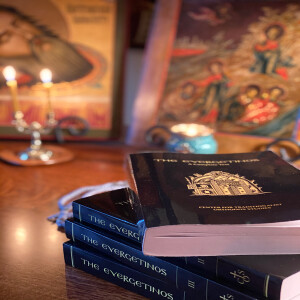
The human appetites and desires are ever so powerful. This we know from experience. Reflecting upon them through the lens of the ascetic life of the desert fathers shows us the scope and the depth of these realities and how they affect our lives.
The spiritual and psychological astuteness of the desert fathers is unparalleled, but we must read their writings in a discerning fashion. We do not want to overgeneralize certain aspects of their teaching and so develop a negative anthropology; a kind of hatred for the body and its’ natural desires. Indeed there are many stories where certain desert fathers fell into great extremes; making themselves ill or placing themselves in grave danger.
The desert fathers had to learn as we do through experience how to approach these desires and to be clear about what they were truly seeking. The goal is purity of heart; a capacity to love and to give ourselves in love freely and without objectifying the other. Understood in this fashion, purity of heart and chastity should increase our capacity to love. It is not a restriction of our freedom but rather a state of being unfettered by our own desire for satisfaction and pleasure. The human heart can be a treacherous thing and at times can lead us along a path of self-destruction even when that path seems to promise the satisfaction of our hearts’ deepest longing. What the fathers came to understand through experience is that Grace alone can bring the healing that we desire and that Divine Eros is what overcomes disordered Eros. The Love of God dwelling within us opens up a path to the fulfillment of life. It is not control that we seek in the ascetic life but transformation; specifically transformation “in Christ.”
---
Text of chat during the group:
00:09:34 Forrest Cavalier: Snowfall in inches in Pittsburgh by season.
00:10:09 Forrest Cavalier: Data from https://www.weather.gov/media/pbz/records/hissnow.pdf
00:10:44 Una: Why do we live in these environs?
00:20:05 Lilly: What page number?
00:20:36 Lori Hatala: 192
00:20:37 Wayne: 192
00:21:03 Lilly: Reacted to "192" with 👍
00:21:06 Lilly: Reacted to "192" with 👍
00:21:37 Una: At last, a woman's experience!
00:36:01 Una: When I'm deep in stillnes, I can see (to some degree) but when I engage with the world, I find it easy to doubt what I've seen
00:36:13 Una: and believed
00:36:16 Personal phone: I often find when I’m trying to exercise discipline (like fasting) on far too many occasions I find myself getting “hangry” and thus an certain I’d be far better to break my fast less than giving into my hanger and exposing that to others
00:36:47 Nikki: What would he have changed to continue clinging to God if it were suggested he lessen his prayer life, fasting, etc?
00:36:54 Una: I suspect this is part of the spiritual battle too and that transitions are important to be guarded
00:38:27 Anthony: As an FYI incase someone distrusts the heart too much: I've run into the opposite error regarding the human heart....the error that says it is so untrustworthy and "totally depraved" that you can't trust anything in your self. I learned it at a formative age, and it's hard to get rid of that error.
00:40:16 Personal phone: Reacted to "I often find when I’…" with ❤️
00:45:34 Una: That comment was a continuation of a previous comment from me
00:46:39 Una: Reacted to "As an FYI incase s..." with ❤️
00:54:10 Nikki: It is natural that the human body has these feelings of arousal, in order for humans to reproduce. What is it the monks here are wanting to achieve? Being able to shut down these hormonal responses in the body? I ask also because this occurs without demonic influence.
00:54:12 Anthony: On this topic of purity, I learned from "The Cave of Treasures" attributed to St Ephrem that the Flood came due to massive fornication.
01:01:02 Lilly: Other than Theology of the Body, are there other sources we can read about this topic?
01:02:13 Lilly: I find it a bit too confusing and romanticized
01:02:26 Judith: Reacted to "I find it a bit too ..." with 👍
01:05:13 Lilly: Like this young monk who didn't have knowledge of his normal bodily functions, how are future-parents supposed to teach their children properly? I don't see myself using Theology of the body as a main source
01:05:48 Anthony: Reacted to Like this young monk... with "👍"
01:08:49 Anthony: Then it looks like the primary teaching should be on the Will: it's formation, inclination, weaknesses and deliberation to do bad or good.
01:09:50 Anthony: Ok. Thank you.
01:14:11 Maureen Cunningham: Thank You Blessing
01:14:19 Personal phone: 6 days! I’d super hangry!
01:15:03 Nikki: Thank you
01:15:09 Suzanne Romano: God bless everyone!
01:15:12 Rebecca Thérèse: Thank you🙂
01:15:21 Aric B: Thank you Father!
6 months ago
love it